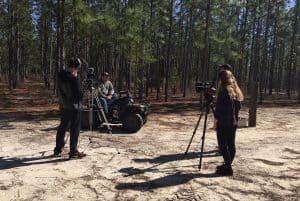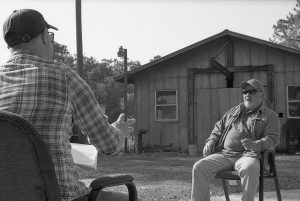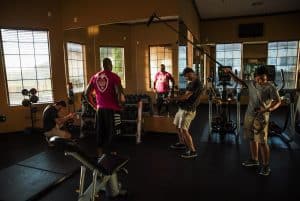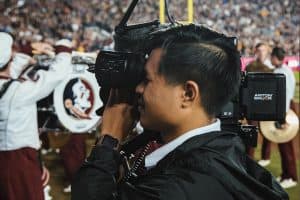UNDERGRADUATE IN
DIGITAL MEDIA PRODUCTION
Program Information
College: Communication & Information
Degree: BA, BS
Limited Access: Yes
Contact: CCI Advising Center
Address:
School of Communication
Suite 3100, University Center C, FSU
P.O. Box 3062664
Tallahassee, FL USA 32306-2664
Phone: (850) 644-7278
Email: Advising@cci.fsu.edu
EXPERIENCES THAT MAKE A DIFFERENCE
The Digital Media Production Program is a limited-access, cutting-edge program designed to prepare students for the rapidly changing world of digital media.
With the proliferation of video equipment and editing software, digital video production has burst through the confines of television studios and Hollywood conventions, allowing small teams to create visual material that is distributed across a host of media. This program gives students the skills needed to become confident visual storytellers and media makers.
Digital Media Production students learn the foundation skills of shooting HD video, recording sound and using lighting for dramatic effect. Alongside these traditional elements, students also learn to use contemporary post production software including Adobe Premiere Pro, Photoshop, Audition and AfterEffects, and a suite of 3D animation software. Students also have the opportunity to learn emerging technologies, such as VR and 360 video production. These tools, combined with a theoretical background in visual storytelling, prepare students for work in industries ranging from film and television, sports media, local production studios and innovative jobs related to streaming video and on-line productions.
The DMP Program focuses on documentary and sports media. This emphasis on reality based visual storytelling teaches students to capture events the first time, because there are no second takes in real life. Whether you are filming a live event or following a player run down the field, our program prepares students to work in a dynamic, ever-changing world that requires technical skill and lightning fast reflexes.
Through documentary and public interest media, students learn the power of real world stories to influence their peers, politics, and public opinion.

Malia Bruker
"The Digital Media Production program gives real word opportunities in the classroom to our students"
Assistant Professor, School of Communication
Produced by Anthony Fins, Parker Foreman, Madeline Hill and Max Rykov in RTV4332 Documentary Video Production in the Fall 2019 semester
Program's Overview
The Digital Media Production Program is a limited-access, cutting-edge program designed to prepare students for the rapidly changing world of digital media. With the proliferation of digital video cameras and desktop editing software, digital video production has burst through the confines of television studios and Hollywood conventions, allowing small teams of people to create visual material that is distributed across a host of media, from traditional television broadcasting to the emerging power of podcasting.
Digital Media Production students learn the foundation skills of shooting digital video, recording sound and using lighting for dramatic effect. Alongside these traditional elements, students also learn to use contemporary post production software including Adobe Premiere Pro, After Effects, Audition and Photoshop, and a suite of 3D animation software. These tools, combined with a theoretical background in visual storytelling, prepare students for work in industries ranging from film and television, sports media, local production studios and emerging jobs related to streaming video and on-line productions.
The Digital Media Production Program includes both an undergraduate major and a graduate certificate. Many of the Media Production Courses are cross-listed as both undergraduate and graduate offerings, with additional requirements of graduate students. Our Production Facilities offer students state-of-the-art equipment on which to learn their craft. Our faculty and staff bring a wealth of experience as well as scholarly expertise.
The undergraduate major is typically a two-year program with an emphasis in one of two areas: Documentary and Public Affairs or Sports Media. A specific program of courses will be developed with an advisor after admission to the program. Sample programs show a typical course load.
Our graduate certificate may be completed as part of a graduate degree program at FSU or as a stand-alone certificate, but a separate application — in addition to the FSU graduate school application — must be completed and approved in order to gain admission to the program. Regardless of whether applicants to the graduate certificate program are seeking a graduate degree or a stand-alone certificate, they must have completed a bachelor’s degree; undergraduate students are not eligible for admission.
Description of Major
The Digital Media Production major exposes students to the history, evolution, and changing state of mass media. Students will develop an appreciation for the economic underpinning of the media, the social effects of the media, legal and ethical issues affecting the production and dissemination of products and programs, the nature of new communication technologies, and techniques employed in the production of the mass media. This major will impart such skills as writing for the media, audience research, computing, announcing, video production, video editing, and developing media plans. A limited number of students are accepted annually.
Note: Specific information related to this interest area is subject to change. Please check with the School of Communication prior to submitting your application.
Prerequisite Coursework
18 hours outside major coursework and beyond General Education.
Note: State-wide common prerequisites are always under review. For the most current information and for acceptable alternative courses, visit the “Common Prerequisites Manual.” This is available from the “Student Services” section of http://www.flvc.org .
Requirements
Admission Requirements to the Upper-Division Major
The School of Communication is a limited access program, restricted by both total numbers of students in each major and minimum grade point average required for application. Each major operates with a different enrollment cap. Achievement of the minimum application GPA does not guarantee admission to a communication major; all admissions are competitive. Admission criteria are available from the School. An application package must be completed and submitted to the School of Communication, see http://www.comm.cci.fsu.edu/. Minimum requirements for review of application include: an overall GPA of 3.0 on all college coursework attempted; completed application submitted to the School of Communication on or before the first business day in February for each year and transcripts from all colleges and universities attended. Students must have completed 52 hours of college coursework by the end of the semester of application. Acceptance by a faculty committee will be based on a review of the application and transcript, and other relevant materials in light of the published admissions criteria. By the end of the spring semester in which the student is applying for admission, s/he must successfully complete two General Education English courses and two General Education math courses as accepted by FSU.
Major Program of Studies at FSU: 39 hours
No grade below a C minus will be accepted for any course in the major. Maintenance of a 3.0 cumulative GPA is required. The School of Communication reserves the right to refuse admission or discontinue enrollment of any student at any time, if, in the judgment of the faculty, the student does not meet departmental or major standards.
Foundation courses: (9 hours)
MMC 2000 (3) Introduction to the Mass Media
SPC 2608 (3) Public Speaking
MMC3505 (3) Documentary History, Theory and Practice
Advanced courses: (6 hours)
Students select two courses (6 hrs) from the list of approved courses; see advisor
Production core: (9 hours)
RTV 3101 (3) Writing for the Electronic Media
RTV 3531 (3) Single-Camera Video Production
RTV 3571 (3) Video Post-Production
Advanced production courses: (12 hours)
Students select four courses (12 hrs) from the approved advanced production list; see advisor
Application/activity courses: (3 hours)
Students complete 3 hours selected from the approved application/activity list; see advisor
Language Requirement
Students formally admitted into any program in the School of Communication must achieve proficiency in one language other than English prior to graduation. Students may fulfill this requirement through a modern, classical, or business language. For students admitted for Fall 2012 and later, S-U grading of modern language courses is acceptable; business language courses must be taken for a letter grade. See the University Bulletin or contact the School of Communcation for details (www.comm.cci.fsu.edu).
Minor Coursework: 12 hours or more.
Majors must fulfill minor requirements in one departmental field outside Communication, with the exception of a minor in Hispanic Marketing. Students should check with minor department for specific requirements. Recommended minors include: Business, English, Political Science, Psychology, Journalism (at FAMU), Sociology, Criminology, History, and British Studies (London Program).
Computer Skills Competency: 3 hours. CGS 2060 (3), CGS 2100 (3), or COM 4470 (3).
Oral Communication Competency: 0 beyond major requirements.
Students must demonstrate the ability to orally transmit ideas and information clearly. SPC 2608 is required for this major and also satisfies this requirement.
Minimum Program Requirements – Summary
Total Hrs. Required 120
General Education 36
Major Coursework 39
Minor Coursework 12 or more
Language Requirement 0-12
Computer Skills 3
Oral Communication Competency 0 beyond major requirements
Electives to bring total credits to 120
Mapping
Mapping is FSU’s academic advising and monitoring system. Academic progress is monitored each Fall and Spring semester to ensure that students are on course to earn their degree in a timely fashion. Transfer students must meet mapping guidelines to be accepted into their majors. View the map for this major at www.academic-guide.fsu.edu/.
Request Information
Program's Courses
Courses in the Digital Media Production program are broken into production, techniques, activities and core courses. The undergraduate major consists of 36 credit-hours taken over two years. Courses are designed to prepare students for a variety of careers in the dynamic field of digital media production.
Production courses are capped at 20-25 students, giving students a lot of individual faculty attention. Unlike other academic majors, Media Production is a collaborative program where students often work in small teams and put in long nights and weekends in order to produce a quality piece of media. This interdependence requires cooperation and teamwork. The bonds forged in this program often result in longterm professional relationships that endure far beyond the university years.
See the Program Guide for the most up-to-date information on requirements for the major. Students may choose to focus their program in one of our two areas of emphasis: Documentary and Public Affairs or Sports Media.
Foundation courses: (9 hours)
MMC 2000 (3) Introduction to the Mass Media
SPC 2608 (3) Public Speaking
MMC3505 (3) Documentary History, Theory and Practice
Advanced courses: (6 hours)
Students select two courses (6 hrs) from the list of approved courses; see advisor
Production core: (12 hours)
RTV 3101 (3) Writing for the Electronic Media
RTV 3531 (3) Single-Camera Video Production
RTV 3571 (3) Video Post-Production
Advanced production courses: (12 hours)
Students select four courses (12 hrs) from the approved advanced production list; see advisor
Application/activity courses: (3 hours)
Students complete 3 hours selected from the approved application/activity list; see advisor
Admissions
Program Information
The Florida State University School of Communication offers three limited access undergraduate major programs (Advertising, Digital Media Production, and Public Relations) and one open access major (Media Communication Studies). The requirements and application processes are different for limited access majors than they are for open access majors.
Open Access Majors
Media Communication Studies is our only open access major. As an open access major, there is no additional application that is required for admission to the program. Prospective MCS students only need to apply for admission to Florida State University and to subsequently declare as an MCS major. For more information, please review the Office of Admissions website.
Limited Access Majors
The competitive application process for prospective ADV, DMP, and PR majors opens for those who have completed minimum course requirements, have at least 52 hours of undergraduate coursework, and have an all-college GPA of 3.0 or higher. This application process occurs once each year with application decisions being communicated in mid-February. New majors are admitted only for the summer and fall semesters.
The remainder of this page is dedicated to instructions for applying to the three limited access programs.
Transfer Students
Undergraduate students not currently enrolled at FSU must apply to the University through the Undergraduate Admissions Application. This is separate from the School of Communication application. For convenience, we have included a link to the Transfer Application Portal.
Application Process
Students seeking admission into a limited access major program within the School of Communication should review the Application Instructions. Beginning on Saturday, November 1, 2025 students will be able to access the application portal and to submit the necessary application materials via the portal.
The online application portal can be accessed here: https://comm-fsu-sm.smapply.us/
Applications are due on or before Wednesday, December 31, 2025 by 11:59 p.m. EST. Applications will not be accepted after the deadline.
Application Information Sessions
Information sessions are held to give interested students more information about the application process and to answer questions concerning the application process. We will briefly overview the application process, the requisite application materials, and will field any questions that attendees might have. There is no requirement that you attend the information sessions, but many students find the sessions helpful as they prepare for the opening of the application window.
Our first information session will be hosted on Zoom on Tuesday, October 28 at 9:00am. The Zoom link for that session is: https://fsu.zoom.us/j/8813318003
Our second information session will also be hosted on Zoom. That session will take place on Monday, November 10 at 9:00am. The Zoom link for that session is also: https://fsu.zoom.us/j/8813318003
Undergraduate Application Deadlines
The application window will open November 1st. The deadline to apply for summer or fall 2026 admission is Wednesday, December 31, 2025, 11:59 p.m. EST. All documents and supporting materials must be received prior to this deadline. Any applications that are incomplete will be considered denied.
We tentatively plan to announce admissions decisions by February 14, 2026. Decisions will be sent to the same email address that was used for the application portal. Depending on the student designation, admission into the major may be contingent upon communicating your acceptance of admission. This requirement will be included in the admission decision email that is sent to you.
For Additional Assistance
Prospective undergraduate students may call the College of Communication & Information Advising Center at 850-644-7278 for an appointment to discuss the application process.
Program's Faculty
Sample Programs
The Digital Media Production undergraduate major consists of 39 credit hours taken over two years. The following sample program is offered as an example of a student’s course load for the duration of the program. Students may choose to focus their program in one of our two areas of emphasis: Documentary and Public Affairs or Sports Media. A specific plan based on student interest will be developed with an advisor after admission to the program.
Documentary and Public Affairs Emphasis
Year One
Fall Semester
- Production Core: Single-Camera Video Production (RTV 3531)*
- Production Core: Video Post Production (RTV 3571)*
- Production Core: Writing for the Electronic Media (RTV 3101)
- Foundation Course: Introduction to Mass Media (MMC2000)
*Required this semester
Spring Semester
- Foundation Course: Documentary Film: History, Theory and Practice (MMC3505)*
- Advanced Production: Advanced Post Production (RTV4571L)
- Activities Credit: Internship (COM4945r)
- Advanced Course: Political Communication and Campaigning (COM3510)
*Required this semester if not earlier
Summer Semester Between Year One and Year Two
Summer internship is encouraged – Internship (COM 4945r).
Year Two
Fall Semester
- Advanced Production: Documentary Video Production (RTV 4332)
- Advanced Production: Advocacy Video Theory & Practice (RTV4291)
- Minor Requirement: One Course to fulfill your minor requirement
- Foundation Course: Public Speaking (SPC2608)
Spring Semester
- Advanced Production: Advanced Lighting and Cinematography (RTV4582)
- Advanced Course: Political Economy of Media (MMC4641)
- Minor Requirement: One Course to fulfill your minor requirement
- Elective Course: Student’s Choice
Sports Media Emphasis
Year One
Fall Semester
- Production Core: Single-Camera Video Production (RTV 3531)*
- Production Core: Video Post Production (RTV 3571)*
- Production Core: Writing for the Electronic Media (RTV 3101)
- Foundation Course: Introduction to Mass Media (MMC2000)
*Required this semester
Spring Semester
- Foundation Course: Documentary Film: History, Theory and Practice (MMC3505)*
- Advanced Production: Multiple-Camera Studio Production (RTV 3227)
- Activities Credit: TV Interviewing and Hosting (RTV3602)
- Advanced Course: Media, Sports and Society (MMC3703)
*Required this semester if not earlier
Summer Semester Between Year One and Year Two
Summer internship is highly encouraged – Internship (COM 4945r).
Year Two
Fall Semester
- Advanced Production: Advanced Feature Reporting (RTV4682)
- Advanced Production: Computer Graphics Animation (RTV3610)
- Minor Requirement: One Course to fulfill your minor requirement
- Foundation Course: Public Speaking (SPC2608)
Spring Semester
- Advanced Production: 3D Video Animation (RTV3611)
- Advanced Course: Social Marketing (COM4560)
- Minor Requirement: One Course to fulfill your minor requirement
- Elective Course: Student’s Choice
- Activities Credit: Video Workshop – Seminole Productions (RTV 3225r)
Student Work
Students who choose to focus on Documentary and Public Affairs will graduate with a deep understanding of non-fiction, social issue media. Whether students go on to work for NGOs and government agencies or produce their own independent documentaries, they will leave the DMP program with a wide set of skills, both technical and creative. Students will learn the ins and outs of developing, shooting and editing their own short documentaries and advocacy videos on current issues of the day. Beyond the core courses on campus, students also have the opportunity to attend Full Frame Film Festival in Durham, NC, one of the most important documentary festivals in the country. Students may also choose to attend the Documentary Experience in Britain, part of FSU’s International Programs summer offerings.
The Supernatural, Interdimensional (and sometimes awkward) Adventures of Scotty Ebberbach
Produced by Anthony Fins, Parker Foreman, Madeline Hill and Max Rykov in RTV4332 Documentary Video Production in the Fall 2019 semester
LEARN MORESerious Fun: A Chinese Ensemble Documentary
Produced by Vy Nguyen, Xiaoyan Wang, Duo Chen, and Kendra Scholz in Documentary Video Production (RTV-4332) during the Spring 2016 semester.
LEARN MOREPlease Don’t Touch My Hair
Produced by Yamoaa Gyimah, Yarden Ben-David, Devin Bittner, and Zach Bernstein in RTV4332 Documentary Video Production in the Fall 2019 semester
LEARN MOREA IS FOR ARMED
Produced by Samantha Hunter and Cristina Fernandez in Documentary Video Production (RTV-4332) during the Spring 2015 semester. This film was an official selection for the Yofi film festival in 2015 and won first place at Ft Lauderdale International Film Festival in the Collegiate Documentary category.
LEARN MOREWELCOME TO SUNLAND
Produced by Mike Kozlenko, Evan Garcia, Rona Akbari, and Chris Sintic in Documentary History (IFS-2103) during the Spring 2016 semester.
LEARN MORESeminole Productions is the award winning “in house” production company in the College of Communication at Florida State University. Seminole Productions provides script writing, creative development, videography, 3D production, graphics and post-production editing services for departments across the FSU campus. They also provide graphics for the live game day experiences/video boards in all FSU sports venues on and off campus including Football, Basketball, Baseball, and more. Seminole Productions also produces the weekly University sports highlight show, Seminole Sports Magazine, which reaches over two million households in Florida via the Sunshine Network. Students have numerous opportunities to become involved with Seminole Productions. Under the direction of Seminole Productions’ talented, professional staff, students can gain hands-on experience in every phase of the production process, positioning them with the knowledge and skills needed in today’s competitive production industry.
Advocacy Video explores the theory and practice of short form video production.The combined process of viewing material and producing original video allows students to connect theory and practice as they explore the potential of short form video advocacy. In addition to production, students examine the distribution potential for these videos by exploring the possibilities presented by social media. Topics covered in the course include the theory and practice of culture jamming, viral video, social marketing, and political advertising.
#UNPLUGYOURDAY
GUNS ON CAMPUS?
Online Resources
Online Resources
No Film School
Every Frame A Painting
Short of the Week
NY Times Op-Docs
Documentary.org
Indie Wire
Phillip Bloom
John Brawley
Vincent Laforet
Hurlbut Visuals
Premium Beat
Filmmaker IQ
Noam Kroll
Video Maker
Film Courage
The Creators Project
Fandor
UFVA
Facilities
The Production Center combines state-of-the-art media production complexes that support the video and audio production activities of the School of Communication. The Production Center houses a variety of equipment and facilities: a fully equipped television studio; video-editing suites in several formats; field production cameras and recorders in each of those formats; computerized on and off-line editing, digital video effects, and computer animation capabilities; non-linear editing; and on-site engineering and management support. The facility was designed around the principle that students need maximum exposure to the equipment to develop the competency required in media production fields.
WFSU-TV is the anchor public television station for the State of Florida. WFSU and the School of Communication have a close working relationship where students are offered the opportunity to learn media production within an active, working television station environment. WFSU produces a series of original programs in Studio A as well as a range of student material that is produced in Studio B and aired on Channel 4. Classes offered at WFSU include Multiple-Camera Studio Production (RTV 3227), Television Interviewing and Hosting (RTV 3234) and Video Workshop (RTV 3225r). http://www.wfsu.org/
WVFS-FM (V-89) is The Florida State University’s student-operated college radio station. Communication students work at V-89 for college credit and are responsible for programming, announcing, news and sports coverage, and all other station operations. V-89 is “the Voice of Florida State,” providing campus information and alternative music programming. V-89 has been the recipient of several national programming awards, and is now available on the World Wide Web through streaming video at: http://www.wvfs.fsu.edu.
Seminole Productions is the School of Communication’s live event production unit. Seminole Productions is a professional live sports broadcasting, sports venue entertainment, and special event production department within the Florida State University’s College of Communication and Information. At Seminole Productions students receive training and mentorship working alongside professionals in producing live sports broadcasts, venue in-game presentations, and special events. Imagine working on a live production being broadcasted all over the world on ESPN. This is happening now at Seminole Productions. With multi-control room studios and state of the art facilities, Seminole Productions is at the top of the college sports production industry. https://sempro.cci.fsu.edu/
CCI Digital Media Services is the School of Communication’s professional video production unit. CCI Digital Media Services (CCI-DMS) uses state-of-the-art technology to provide video production services to the Florida State University community and to state agencies when applicable. CCI-DMS main objective is to provide FSU students with these professional experiential opportunities while helping the university achieve its goals. The unit is led by Jim Garbarino, Digital Media Services’ Director. Garbarino is an experienced broadcast industry professional with over 27 years of professional experience. During his professional career, he produced over 600 television shows for FOX Sports and has also freelanced for multiple media outlets including ABC, CBS, ESPN, and PBS among others. Jim has been recognized with over 70 national and international awards for his show producing, video creation, editing, graphical skills, and much more. https://cci.fsu.edu/cci-digital-media-services/







